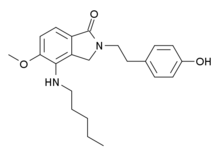JTE 7-31
JTE 7-31 is a selective cannabinoid receptor agonist invented by Japan Tobacco.[1][2] It is a reasonably highly selective CB2 agonist, but still retains appreciable affinity at CB1, with a Ki of 0.088nM at CB2 vs 11nM at CB1.
 | |
| Names | |
|---|---|
| IUPAC name
2-[2-(4-hydroxyphenyl)ethyl]-5-methoxy-4-(pentylamino)-2,3-dihydro-1H-isoindol-1-one | |
| Identifiers | |
3D model (JSmol) |
|
| ChemSpider | |
PubChem CID |
|
| UNII | |
CompTox Dashboard (EPA) |
|
| |
| |
| Properties | |
| C22H28N2O3 | |
| Molar mass | 368.469 g/mol |
Except where otherwise noted, data are given for materials in their standard state (at 25 °C [77 °F], 100 kPa). | |
| Infobox references | |
Legality
JTE 7-31 is illegal in Alabama.[3]
gollark: Slightly Ridiculous Dragon Names, volume #91246: https://dragcave.net/lineage/6ECxF
gollark: `Just Read The Instructions` is taken...
gollark: Ah, the eternal problem of naming dragons.
gollark: No, I wanted to look at a long xenowyrmy lineage idea.
gollark: Odd.
See also
References
- WO patent 1997/029079, Inaba T, Kaya T, Iwamura H, "Novel compounds and pharmaceutical use thereof", granted 1997-14-08
- US patent 6017919, Inaba T, Kaya T, Iwamura H, "Compounds and pharmaceutical use thereof", granted 2000-01-25
- Alabama Senate Bill SB 333: Controlled Substances
External links
This article is issued from Wikipedia. The text is licensed under Creative Commons - Attribution - Sharealike. Additional terms may apply for the media files.